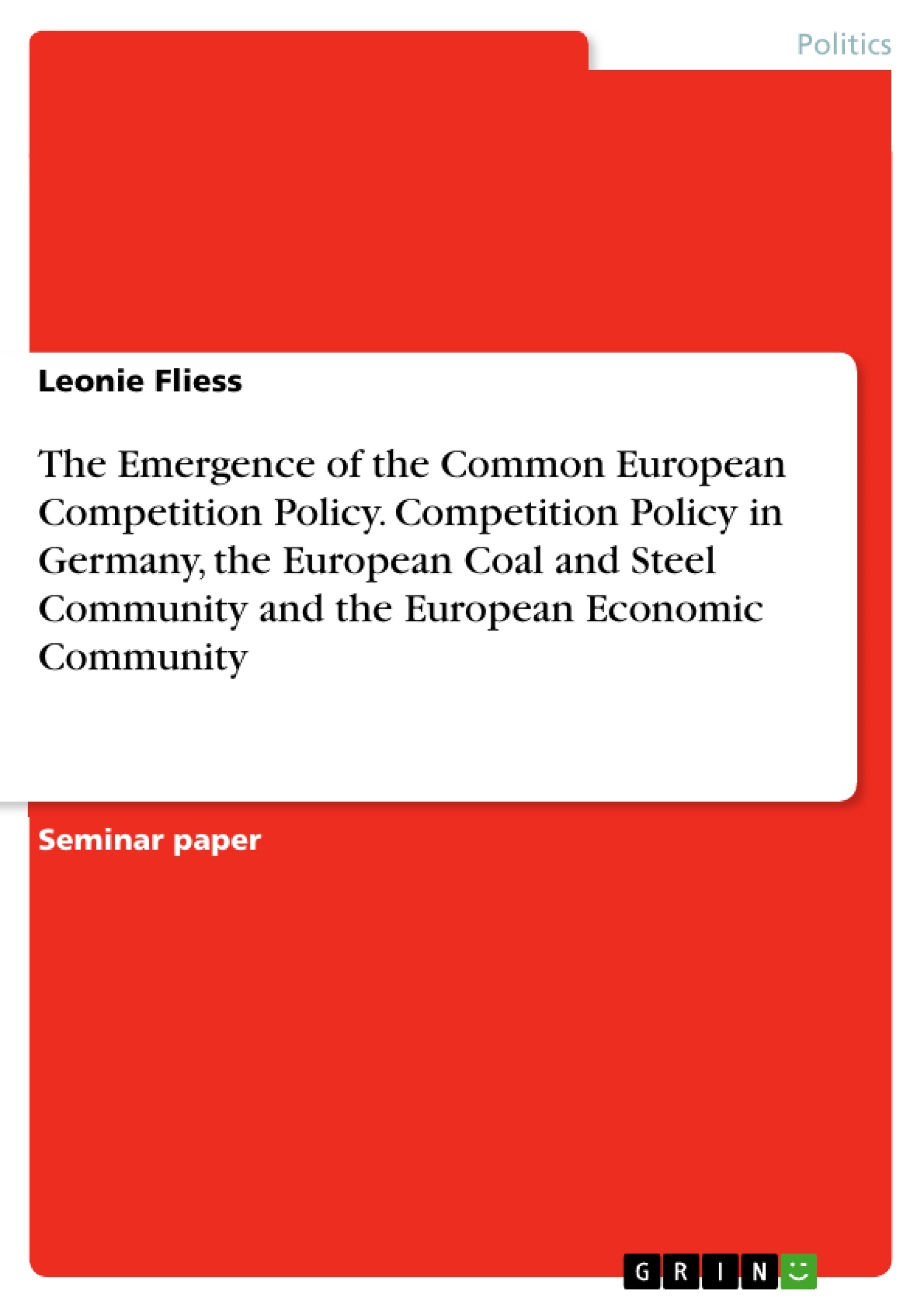In this paper I will address the emergence of the European competition law in the 1950s and early 1960s and draw a special focus on how Germany and its national competition policy influenced the European course.
The main part of this paper is subdivided into three parts, the Competition Policy in Germany, the European Coal and Steel Community and the European Economic Community.
Therefore I will first discuss the development of German competition policy.
In particular, I will explain the deconcentration and decartelisation of the German coal and steel industry. Thereafter I will give a short introduction into ordoliberalism as it influenced the German idea of competition policy and lastly give a summary of the history of the German competition law’s beginnings.
Afterwards I will deal with the foundation of European Coal and Steal Community and analyse the Treaty of Paris, the treaty which established the ECSC. Finally I will draw attention on how the Treaty of Paris was implemented and shortly comment on the reconcentration of the German steel industry.
In the last part I will discuss the emergence of the European Economic Community. I will give an overview of the drafting of the Spaak Report and thereafter discuss the Treaty of Rome and the competition policy provisions it contains. That leads me to Regulation 17/62 which implements the Treaty of Rome to finally conclude with the German influence on the
Treaty of Rome and Regulation 17.
Inhaltsverzeichnis (Table of Contents)
- Introduction
- Competition policy in Germany
- Deconcentration and Decartelisation in Germany
- Ordoliberalism
- The Beginnings of German Competition Policy after the Second World War
- The European Coal and Steel Community
- The Foundation of the ECSC
- The Treaty of Paris
- Implementation of the Treaty of Paris and Reconcentration in Germany
- The European Economic Community
- The Spaak Report
- The Treaty of Rome
- German Influence on the Treaty of Rome
- Regulation 17 and the Implementation of the Treaty of Rome
- Conclusion
Zielsetzung und Themenschwerpunkte (Objectives and Key Themes)
This paper examines the emergence of European competition law in the 1950s and early 1960s, focusing on how German national competition policy influenced its development. The main part is divided into three sections: Competition Policy in Germany, the European Coal and Steel Community, and the European Economic Community.
- The deconcentration and decartelisation of the German coal and steel industry
- The influence of ordoliberalism on German competition policy
- The foundation of the European Coal and Steel Community and the implementation of the Treaty of Paris
- The emergence of the European Economic Community, including the drafting of the Spaak Report and the competition policy provisions of the Treaty of Rome
- The role of Germany in shaping the Treaty of Rome and Regulation 17
Zusammenfassung der Kapitel (Chapter Summaries)
- The chapter "Competition policy in Germany" delves into the deconcentration and decartelisation efforts following World War II. It discusses the breaking down of cartels in the German steel industry, the role of the Potsdam Agreement, and the resistance faced by Germany.
- The chapter "Ordoliberalism" explores the ideological influence of ordoliberalism on German competition law. It explains the origins of the Freiburg School and its key principles, emphasizing the importance of a strong state to establish a legal framework for the economy and ensure individual economic freedom.
- The chapter "The Beginnings of German Competition Policy after the Second World War" examines the development of German competition law after the war. It highlights the role of the United States in establishing a decartelisation law and the influence of ordoliberalism on Ludwig Erhard's efforts to establish an autonomous competition policy for Germany.
- The chapter "The European Coal and Steel Community" explores the foundation of the ECSC and the Treaty of Paris. It examines the process of reconcentration in the German steel industry after the implementation of the Treaty of Paris.
- The chapter "The European Economic Community" examines the emergence of the EEC, including the drafting of the Spaak Report, the competition policy provisions of the Treaty of Rome, and the role of Germany in shaping the Treaty of Rome and Regulation 17.
Schlüsselwörter (Keywords)
The main keywords and focus topics of this paper include German competition policy, ordoliberalism, deconcentration, decartelisation, European Coal and Steel Community (ECSC), Treaty of Paris, European Economic Community (EEC), Spaak Report, Treaty of Rome, Regulation 17, and the influence of national competition policies on European integration.
Frequently Asked Questions
How did Germany influence European competition law?
Germany's national policies, particularly the principles of ordoliberalism and its post-war decartelisation efforts, heavily influenced the drafting of the Treaty of Rome and Regulation 17/62.
What is Ordoliberalism?
Ordoliberalism is a school of economic thought (Freiburg School) that advocates for the state to create a strict legal framework to ensure fair competition and economic freedom.
What was the purpose of the Treaty of Paris?
Signed in 1951, the Treaty of Paris established the European Coal and Steel Community (ECSC), aiming to integrate the heavy industries of member states to prevent future conflicts.
What is Regulation 17/62?
It was the first regulation to implement the competition rules of the Treaty of Rome, centralizing enforcement power within the European Commission.
What role did the Spaak Report play?
The Spaak Report provided the foundational framework for the European Economic Community (EEC) and its common market, leading directly to the Treaty of Rome.
- Quote paper
- Leonie Fliess (Author), 2015, The Emergence of the Common European Competition Policy. Competition Policy in Germany, the European Coal and Steel Community and the European Economic Community, Munich, GRIN Verlag, https://www.grin.com/document/368469



